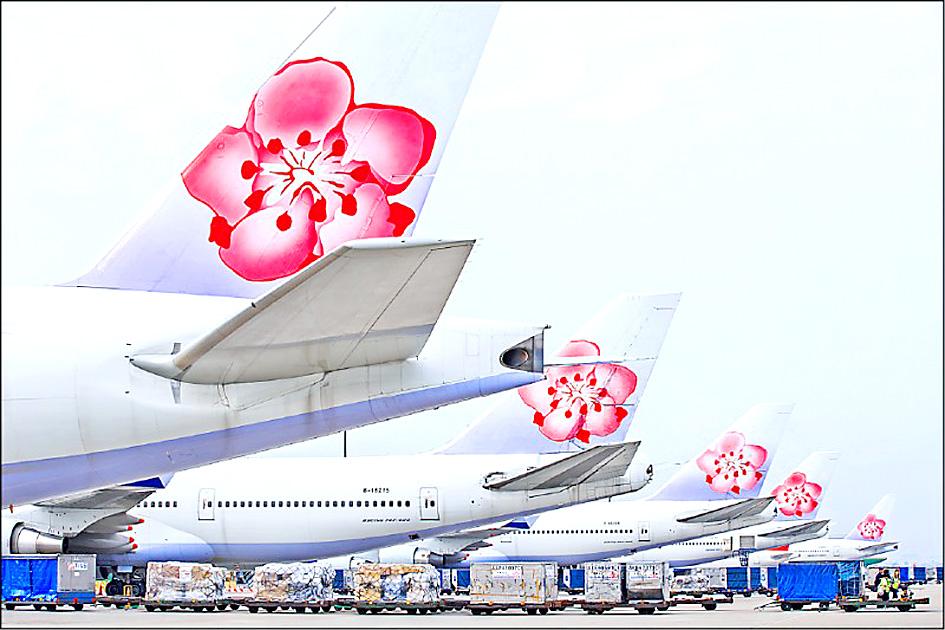China Airlines Ltd (CAL, 中華航空) is to increase its free baggage allowance by 10kg for passengers flying to Europe, Australia or New Zealand, while lowering its fee for luggage exceeding the free weight limit, it said yesterday.
The move is the airline’s latest effort to attract passengers, after local rival EVA Airways Corp (長榮航空) late last month announced that from Thursday it would increase its free baggage weight allowance for all passengers.
For economy-class passengers who fly to destinations other than the US and Canada, CAL currently has three weight limits for free baggage based on the airfare — 20kg for “discount” tickets, 30kg for “basic” and “standard” fares, and 35kg for “flex” fare, its Web site showed.

Photo courtesy of China Airlines Ltd
Each fare offers different services, such as seat selection or the ability to change a flight without charge, the company said.
The weight limits have been increased by 10kg starting from yesterday, it said.
Under the change, economy-class passengers can check 45kg of baggage for free if they buy tickets under the “flex” fare category, it said.
EVA is to offer a maximum baggage allowance of 46kg for economy-class passengers, but requests that they check only two pieces of luggage not exceeding 23kg each.
CAL is also to lower its fee for luggage that exceeds the free weight limit for passengers flying to Asian destinations from US$15 per kilogram to US$8 per kilogram, and reduce the charge for passengers flying to Europe, Australia and New Zealand from US$45 per kilogram and US$30 per kilogram respectively to US$10 per kilogram, it said.
The airline reported that passenger revenue grew 231 percent year-on-year to NT$489 million (US$16.45 million) last month, its highest passenger revenue in a single month this year, thanks to a significant growth in passenger numbers and higher ticket prices.
For the first five months of the year, the airline’s passenger revenue expanded 37 percent to NT$2.36 billion, which is still dwarfed by its cargo revenue of NT$128 billion during the same period, company data showed.

In Italy’s storied gold-making hubs, jewelers are reworking their designs to trim gold content as they race to blunt the effect of record prices and appeal to shoppers watching their budgets. Gold prices hit a record high on Thursday, surging near US$5,600 an ounce, more than double a year ago as geopolitical concerns and jitters over trade pushed investors toward the safe-haven asset. The rally is putting undue pressure on small artisans as they face mounting demands from customers, including international brands, to produce cheaper items, from signature pieces to wedding rings, according to interviews with four independent jewelers in Italy’s main

Japanese Prime Minister Sanae Takaichi has talked up the benefits of a weaker yen in a campaign speech, adopting a tone at odds with her finance ministry, which has refused to rule out any options to counter excessive foreign exchange volatility. Takaichi later softened her stance, saying she did not have a preference for the yen’s direction. “People say the weak yen is bad right now, but for export industries, it’s a major opportunity,” Takaichi said on Saturday at a rally for Liberal Democratic Party candidate Daishiro Yamagiwa in Kanagawa Prefecture ahead of a snap election on Sunday. “Whether it’s selling food or

CONCERNS: Tech companies investing in AI businesses that purchase their products have raised questions among investors that they are artificially propping up demand Nvidia Corp chief executive officer Jensen Huang (黃仁勳) on Saturday said that the company would be participating in OpenAI’s latest funding round, describing it as potentially “the largest investment we’ve ever made.” “We will invest a great deal of money,” Huang told reporters while visiting Taipei. “I believe in OpenAI. The work that they do is incredible. They’re one of the most consequential companies of our time.” Huang did not say exactly how much Nvidia might contribute, but described the investment as “huge.” “Let Sam announce how much he’s going to raise — it’s for him to decide,” Huang said, referring to OpenAI

The global server market is expected to grow 12.8 percent annually this year, with artificial intelligence (AI) servers projected to account for 16.5 percent, driven by continued investment in AI infrastructure by major cloud service providers (CSPs), market researcher TrendForce Corp (集邦科技) said yesterday. Global AI server shipments this year are expected to increase 28 percent year-on-year to more than 2.7 million units, driven by sustained demand from CSPs and government sovereign cloud projects, TrendForce analyst Frank Kung (龔明德) told the Taipei Times. Demand for GPU-based AI servers, including Nvidia Corp’s GB and Vera Rubin rack systems, is expected to remain high,